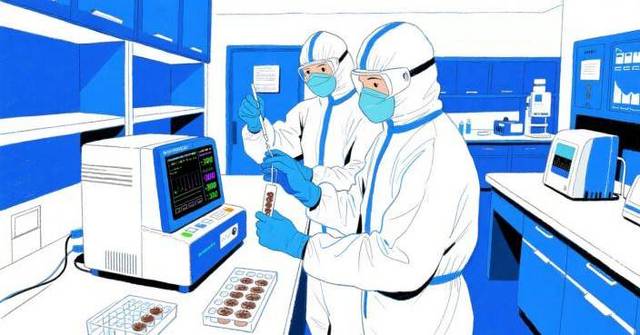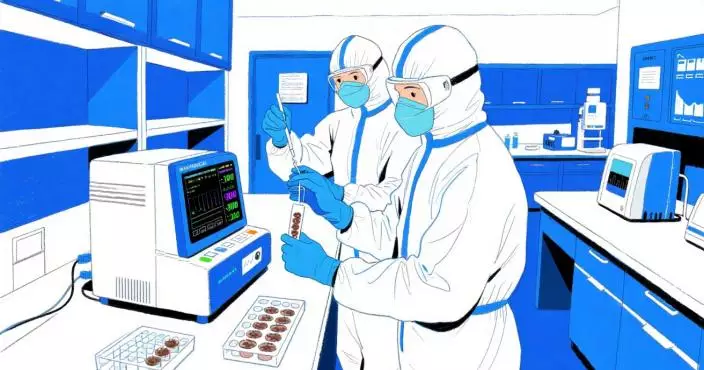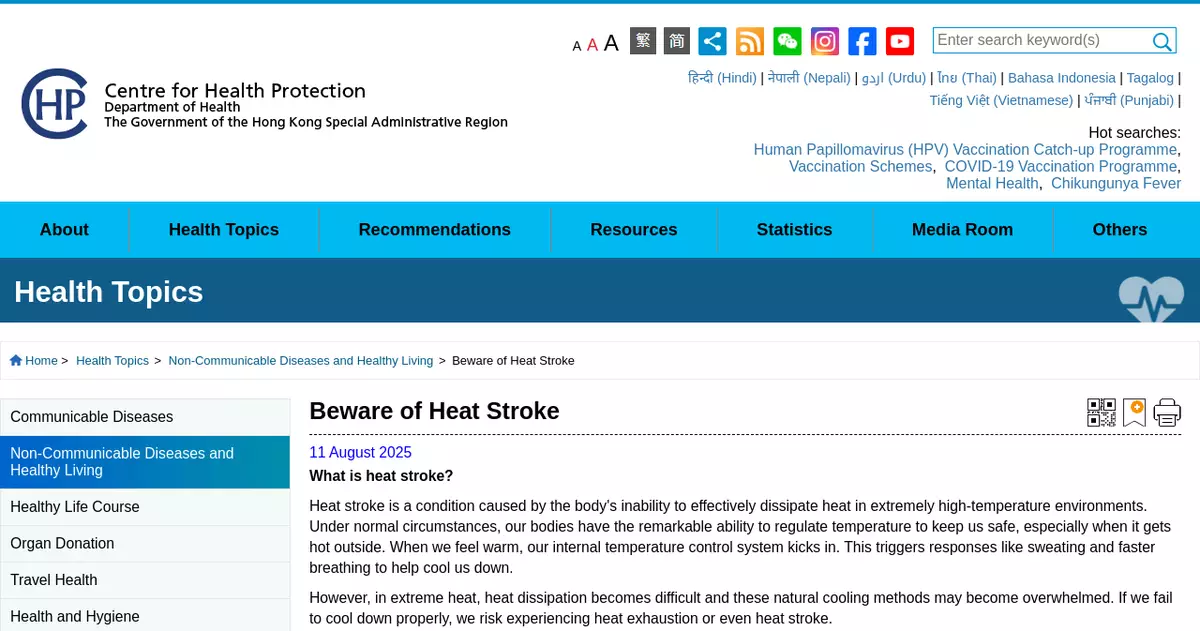Speech by FS at International Bio-Computing Innovation Summit 2025
Following is the speech by the Financial Secretary, Mr Paul Chan, at the International Bio-Computing Innovation Summit 2025 today (September 29):
Liu Wei (Co-founder and Chief Executive Officer of BioMap), Clara (Chief Executive Officer of the Hong Kong Investment Corporation Limited (HKIC), Ms Clara Chan), distinguished speakers and guests, ladies and gentlemen,
It is a pleasure to join you all today for the Second International Bio-Computing Innovation Summit. I’m delighted to see such a strong turnout of global scientists, industry leaders, investors and young innovators in Hong Kong. Your presence reflects the growing momentum and shared vision in shaping the future of bio-computing.
Just over a year ago, we gathered here with a sense of anticipation and purpose. We discussed the transformative potential of AI in accelerating the development of life sciences and pharmaceuticals. We also witnessed the strategic collaboration between the Hong Kong Investment Corporation and BioMap, marked by the establishment of BioMap’s InnoHub right here in Hong Kong.
Fast forward one year, we find ourselves in a world evolving at an extraordinary pace – especially in the realm of AI innovation. Large language models such as DeepSeek are shocking the world. Embodied AI is breaking new ground, with dramatic breakthroughs in vision-language-action models and robot dynamics.
In healthcare, the applications of AI are expanding at a remarkable scale. AI is now helping us predict molecular structures and accelerate drug discovery. It is enhancing diagnostic accuracy, enabling personalised medicine, and supporting the creation of human digital twins that revolutionise clinical trials. It is also empowering synthetic biology, opening up many new application frontiers, from biomaterials to agriculture.
These exciting developments all point to the fact that AI can be a powerful force for good, helping people live longer, stay healthier and lead happier lives.
Hong Kong’s vision
Hong Kong is actively positioning itself at the forefront of AI and biotech development. We are making strategic and substantial investments in these fields, and forging closer partnerships among the Government, the industry, academia as well as the research and investment sectors.
The HKIC plays a vital role in driving these investments. By investing and co-investing in projects, it is channelling capital into sectors that we aim to develop. Currently, among its portfolio of over 130 projects, a significant number are focused on AI and biotech. Notably, around 20 per cent of its invested capital are deployed in biotech initiatives.
I’m pleased to see that the HKIC’s collaboration with BioMap is already bearing fruit. Since its establishment last year, the InnoHub has commissioned a number of high-impact initiatives. Today, we will witness the launch of three new projects, developed in partnership with leading local universities and regional collaborators. These projects are pushing the boundaries of research excellence, empowering education and accelerating the commercialisation of research outcomes.
Hong Kong is indeed brimming with collaboration opportunities in this space. Both of our medical schools rank among the world’s top 25. Five of our universities rank in the global top 50 in AI and data science. Twenty-eight laboratories and centres in the InnoHK research cluster are in partnership with leading institutions worldwide. All these are home to world-class research teams and pioneering projects.
Taking a broader perspective, Hong Kong has what it takes to shine in bio-computing. That includes a thriving innovation and technology ecosystem; access to capital, data and markets; supportive government policies, and world-class talent. In the interest of time, I’d like to highlight just two of these strengths: capital and government policies.
A vibrant capital market
First, access to capital. Hong Kong offers a full range of financing options for companies at different stages of development to grow and scale.
Our stock market is an important pillar. Since listing reforms were implemented in 2018, over 75 biotech firms have listed in Hong Kong, raising over US$30 billion, making us the world’s second-largest biotech fundraising hub. This year, our stock market has been performing very well, with IPOs (initial public offerings) raising over US$17 billion in the first eight months, nearly seven times the amount raised during the same period last year. Notably, biotech companies accounted for around 20 per cent of these funds.
Beyond public markets, Hong Kong boasts a vibrant private capital ecosystem. We are home to over 650 private equity and venture capital firms, managing US$230 billion in assets, second only to the Chinese Mainland in Asia.
Supportive government policies
Second, supportive government policies. AI and biotech are among the strategic sectors prioritised by the Government. In the Policy Address as well as the Budget this year, we outlined a series of forward-looking initiatives to accelerate AI development – focusing on algorithms, computing power, data, capital and talent.
To drive the biotech sector forward, we are working to establish a primary evaluation mechanism for drug approvals, aiming to position Hong Kong as an internationally recognised regulatory authority. We are also strengthening cross-boundary collaboration on drug development. For example, in the Hetao Innovation and Technology Park, Hong Kong and Shenzhen have established cross-boundary clinical trial institutions, enabling studies that meet the regulatory standards of both jurisdictions. These efforts will help Hong Kong emerge as a regional drug development hub because the time-to-market for innovative drugs to be developed here can be greatly shortened.
Enterprises and talent
But for our vision to materialise, it ultimately comes down to people and the enterprises they build. That’s why we are relentlessly attracting high-impact enterprises engaged in cutting-edge technologies to Hong Kong. In fact, many of the companies attracted through our Office for Attracting Strategic Enterprises are leading players in AI and biotech. A new batch of strategic enterprises to be announced in a couple of weeks will include several world-class pharmaceutical leaders. I’m proud to say that our AI and biotech ecosystem is becoming more dynamic and globally connected.
In a world that is increasingly complex, fast-changing and technologically fragmented, Hong Kong remains open: open to talent, and open to innovation and collaboration. We welcome scientists, innovators, entrepreneurs, researchers and students to join our growing ecosystem and co-create a future where technology advances the progress of humanity.
Ladies and gentlemen, the convergence of AI and biotech will be one of the most powerful forces shaping the future of science, healthcare and innovation. Hong Kong is committed to being a leader in this journey, where we connect the brightest minds, the best resources and boundless opportunities across borders.
On this note, I wish this Summit every success, and to all of you, good health and business in the time ahead.
Source: AI-found images
DH reminds public to take precautions against heat-related illnesses during very hot weather
The Centre for Health Protection (CHP) of the Department of Health (DH) today (September 29) reminded members of the public to take appropriate precautions against heat-related illnesses, such as heat cramps, heat exhaustion and heat stroke during very hot weather.
In a high-temperature environment, excessive sweating and difficulty in heat dissipation can cause stress to the body. Members of the public should take the following precautions:
Hydrate in a timely manner to prevent dehydration;
Wear light-coloured, loose-fitting and breathable clothing to minimise heat absorption and facilitate perspiration and heat dissipation;
Keep the room well ventilated, e.g. by opening windows;
Avoid strenuous exercise and prolonged activities such as hiking or trekking;
Arrange outdoor activities in the morning or the late afternoon, if possible, and bring enough water; and
Avoid beverages containing caffeine, such as coffee and tea, as well as alcoholic beverages, which may speed up water loss through the urinary system.
In addition, infants and children, the elderly, pregnant women, individuals with chronic illnesses such as heart disease or high blood pressure, outdoor/manual workers, and overweight people are more susceptible to heat stroke. These groups should pay special attention to the following:
Avoid taking infants and young children outside when the temperature is high. If they must go outside, adults should ensure they stay in places with moderate temperatures and good ventilation or air-conditioning. Infants and young children should never be left unattended in a confined space such as a vehicle;
The elderly, pregnant women, individuals with chronic illnesses or overweight people should pay close attention to their health. They should seek help as soon as possible if they experience any abnormalities in health indicators such as blood pressure, heart rate, etc or if there are fluctuations in their health conditions. Avoid going out when the temperature is high. Make sure there is good ventilation, or turn on a fan or air-conditioner to keep an appropriate temperature indoors. High temperatures can also worsen the condition of people with chronic illnesses (such as cardiovascular and respiratory diseases). Therefore, they should have an ample supply of their usual medication and keep in contact with family members, neighbours and the community. People should seek immediate help if they feel unwell.
Outdoor/manual workers are advised to reschedule work to cooler hours as far as feasible. If working in a hot environment is unavoidable, provide shade where practicable and use ventilation and heat dissipation equipment. Once work has begun, gradually adjust the pace of work and take breaks in the shade to regain strength.
”Heat stroke is one of the most common health risks in hot weather. Over the past five years, there have been over 200 hospital admissions due to heat stroke each year in Hong Kong, with two to five fatal cases occurring mainly during the summer months from May to September. Vulnerable groups are more susceptible to heat stroke. Symptoms include dizziness, headache, nausea, shortness of breath or confusion. In severe cases, patients may suffer from convulsions or become unconscious, which can be life-threatening if they are not cooled down and resuscitated in a timely manner,” a spokesman for the CHP said.
Members of the public are also advised to pay attention to the latest weather, as well as the real-time and forecasted ultraviolet (UV) index released by the Hong Kong Observatory (HKO). When the UV index is high (6 or above):
Minimise direct sunlight exposure to the skin and the eyes;
Apply broad-spectrum, water-resistant sunscreen with a sun protection factor (SPF) of at least 30 or higher when participating in outdoor activities. Reapply sunscreen every two hours if staying outdoors for long periods of time, or after swimming, sweating or toweling off;
While using DEET-containing insect repellents for personal protection against mosquito-borne diseases, apply sunscreen before insect repellent;
Seek shade;
Wear UV-blocking sunglasses;
Wear loose-fitting clothing with long-sleeves; and
Wear a wide-brimmed hat or use an umbrella.
If symptoms develop, such as dizziness, headache, nausea, shortness of breath or confusion, rest and seek help immediately, and seek medical advice as soon as possible.
The public may obtain more information from the DH’s Health Education Infoline (2833 0111), heat strokepage andUV radiation page; the HKO’s Dial-a-Weather (1878 200),latestweather report and forecast, UV Indexand weather information for hiking and mountaineering; and press releases of the Labour Departmenton precautions against heat stroke for outdoor workers and their employers when the Heat Stress at Work Warning is in force.
Source: AI-found images



